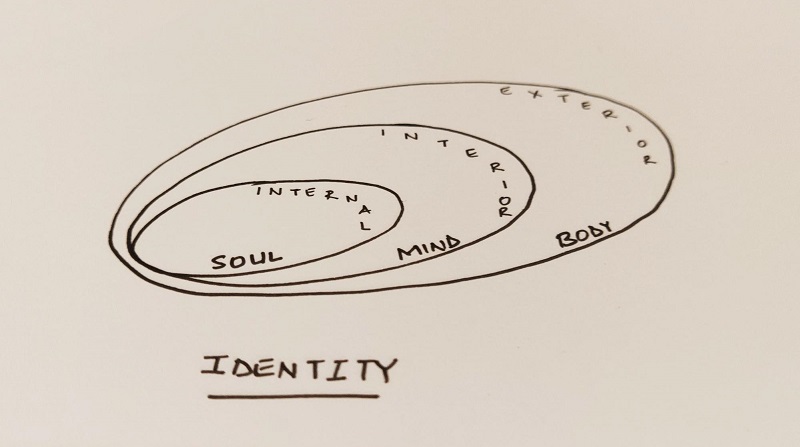Self-Parenting Strategy: Take Self-Talk Beyond Criticism
Episode #7 of the course Reparenting yourself by Sonia Chauhan
Years ago, I visited a doctor to treat my toe infection. To my surprise, he was also a holistic healer. During our conversation, he told me something that’s stuck with me till today. He said, “The mind is just an organ. You are bigger than your mind.” Then, he drew an image, something like this:
Image by Self
Our identity is an amalgamation of three distinct parts: Soul (internal), Mind (interior), and Body (exterior). Equal attention must be given to each part to strike a balance. But often, we give too much importance to our body or our thoughts, and we get consumed by them.
Self-criticism is a prime example of this. When we adopt negative opinions of the self, we give our thoughts more important than our identity. This is how we get stuck in a damaging loop.
Remember, your thoughts are one facet of you. Similarly, your inner child is another facet. Your inner part is another facet. Of you. You are more, much more than all of these.
Treat Your Inner Child/Parent as a Separate Person
Your inner critic is usually the voice of an internalized parent, a mother who constantly criticized your actions or an over-achiever father who imposed military standards. It could also be the voice of a wounded inner child who wants to protect you from getting hurt again.
Whatever it may be, criticism always comes from a place of fear. Perhaps our mother was fearful that we won’t make it in the world and in her head, she was simply “correcting” us. Or the overachiever father’s ego got in the way of his compassion.
Over time, the inner critic becomes so familiar that we stop noticing it as a separate voice. It becomes our voice. So, the first step to fight your inner critic is to notice your negativity.
How do you do this?
Imagine your inner child/parent as someone else who you care about, like a best friend, a younger sibling, or even your own child. This way you see them as separate from yourself, and it gets easier to be empathic to their flaws.
This exercise is based on Gestalt therapy, an experiential therapy where we, ourselves discover and interpret our real feelings in a controlled environment. This can be done either with a therapist or alone through meditation or journaling, rather than mindlessly lashing out on others we meet in our daily lives, or worse, hating ourselves for our shortcomings.
Begin a Conversation
The Inner Child Work you’ve been doing until now was focused on knowing your inner feelings. Now, it’s time to voice your feelings in an attempt to find out their origins.
Always voice your feelings in a safe space: through writing, talking to a therapist, or opening up with a close friend. Simply talk/write down your inner critic’s voice – the messages it constantly gives you, and the intent behind those messages.
Try not to judge your inner critic. Don’t justify its bad actions, but at the same time, be careful that you don’t convert this dialogue into an argument.
Fight Your Inner Critic
If you’ve done my course on negative thinking, this activity will seem familiar. The absolute best way to challenge the inner critic is with logic.
The ABCDE Method by Dr. Martin Seligman lists five practical stages of challenging your inner critic. These are:
Adversity: Think of a recent setback that hounds you.
E.g., “I missed the deadline on my assignment. The professor said he was so disappointed in me.”
Belief: What does this situation make you believe about yourself?
E.g., “He hates me now. I botch everything up.”
Consequence: Your actions and feelings, as a result.
E.g., “I feel pathetic, I’m going to skip his class. What’s the point?”
Dispute: Challenge your belief with evidence.
E.g., “Well, he never said that he hates me. He was disappointed, which means he expected me to do better. All my assignments were on time this year.”
Energy: Does this shift your emotional state?
E.g., “I’ll apologize and ask for an extension. Now I’ve to make this assignment awesome.”
Inner Child Work Exercise
Write a letter from your adult-self to your child-self. Validate their emotions as an ideal parent would. Empathize with them. Now, what would you like to tell your child-self?
In the next lesson, you will learn how to approach your Wounded Inner Child.
Recommended reading
How to Fight Off Your Inner Critic
Share with friends


